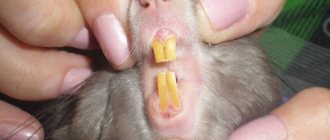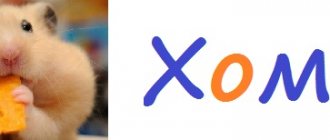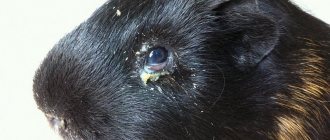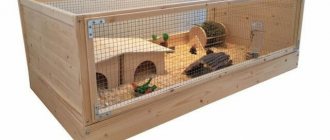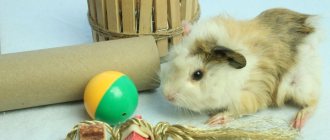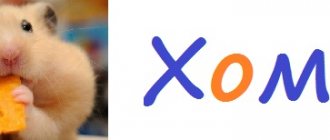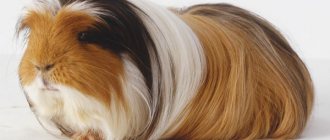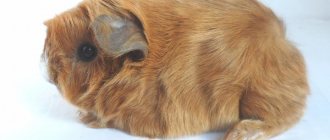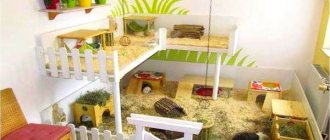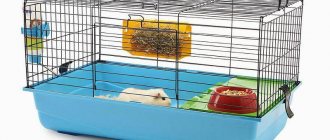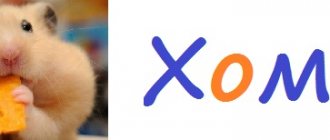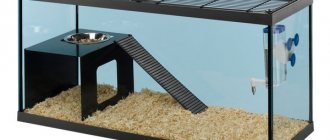Brittle teeth in guinea pigs are a natural phenomenon. Partially or even completely broken incisors grow back in 2-3 weeks. True, while they are growing, the animal may experience pain and discomfort when eating solid food. The animal will eat hay and grass without any problems, but it will have to grate root vegetables. In addition, grain and dry food should be excluded from the pet’s diet during this period.
A more unpleasant problem is the chipping of the cutter. Your pig's chipped teeth will wear down unevenly unless you contact your veterinarian for artificial grinding.
Dental problems in guinea pigs are not uncommon. These animals are characterized by malocclusion, dental diseases, falling out teeth, broken teeth, and inflammation of the mucous membrane. All this causes concern among owners. However, not all of the above problems lead to sad consequences, some are easily solved, and some even go away on their own.
Dental system of the guinea pig
The teeth of rodents are the main tool. It may seem that a guinea pig has only 4 of them. But in addition to incisors, it has molars and premolars, which are called cheek teeth. They have a folded, tuberous structure. In total, there are 20 elements in the dental system of these animals. The animal bites off pieces of food with its incisors and crushes it with premolars and molars. Guinea pigs do not have fangs; in their locations there are empty spaces called diastemas.
Babies are born with baby teeth, and by the age of one year they are replaced with permanent teeth. Molars can fall out for various reasons. Losing 1-2 teeth is normal and there is no need to worry about it. The incisor has an open root, they grow constantly. The animal needs to grind them down, so adding hard food to the pet’s menu is a prerequisite. The enamel on the incisors is only on the front side; the back part is ground off, which makes the edges sharp. With a normal bite, there is no contact between the lower and upper incisors. The lower part of the system can move in any direction.
What to pay attention to
If you spend enough time with the animal, play and communicate, and often observe its behavior, you will be able to notice the onset of the disease.
When problems with teeth arise, an always cheerful or active creature becomes more lethargic and sad. The pig may refuse food completely or choose soft vegetables and fruits without touching the hay. She has problems with bowel movements - she goes to the toilet rarely and little, or does not go at all.
www.warrenphotographic.co.uk
While chewing, you may hear the sound of teeth knocking against each other, wheezing, or coughing. Some pigs have watery eyes and noses, and their chins become wet from drooling.
Darkening and yellowing of teeth, the appearance of wounds on the lips are other symptoms of the disease.
Symptoms of dental pathologies
The main danger that arises from dental diseases in these animals is sudden weight loss, anorexia, which can lead to the death of the animal. It is advisable to identify the symptoms of the disease as early as possible and take action. One of the preventive measures is regular weighing. This procedure needs to be carried out once a week. One-time weight loss is not an indicator of the presence of the disease. But if the next weighing of your pet shows additional weight loss, it is urgent to determine the cause.
There are several symptoms that appear when there are problems in the dental system. You need to carefully examine your guinea pig's teeth if:
- the animal cannot eat solid food, tries to take it into its mouth, but it falls out;
- there is excessive salivation due to problems with swallowing;
- the chewing process takes place on one side;
- in the process of chewing food, the pet moves its ears strongly;
- the animal cannot completely close its mouth.
Sometimes guinea pigs grind their teeth. In this way, animals grind down their incisors. But in some cases, the pet chatters its teeth if it feels pain and wants to drown it out.
There are also more obvious signs of serious dental pathologies:
- the tooth is loose;
- ulcers, lesions, and tears appeared on the cheeks;
- a tumor appeared on the cheek, near the eyes;
- the incisors are positioned incorrectly.
The roots of the teeth can grow into the sinuses. In this case, purulent discharge appears on the nose and eyes. Any of these symptoms is a reason to urgently contact a veterinary clinic.
When do you need veterinary help?
Contact a specialist with any questions regarding the condition of our little brothers. It is better to get professional advice in time and quickly begin treatment in order to help your pet as quickly as possible. In some cases, a visit to the veterinarian must be urgent. This depends on the condition of the guinea pig and the problem discovered by the owner.
For dental trauma
If the tooth is only slightly chipped, its edge is not too sharp, you don’t have to disturb the rodent, everything will grow back in 1-2 weeks. Just make sure your pig is eating normally and not losing weight. Also make sure that the remaining teeth do not injure the opposite cheek and gum.
But if the fragment is uneven, the tooth is broken too much or broken completely, visit the veterinarian. He will be able to provide the following assistance:
- Wash the wound in the gum with a saline solution (1 teaspoon of table salt per ½ liter of water) and teach you how to do this for independent use at home;
- grinds down the sharp edge of a broken tooth;
- will shorten other teeth so that they do not injure the oral cavity.
When extending roots
In rodents, tooth roots that are longer than normal cannot be externally determined. But they can cause malnutrition, and as a result, weight loss in the guinea pig. If you notice that your animal has lost weight, take it to the vet immediately. If no other cause of exhaustion is found, this assumption should be checked with x-rays.
If the elongation of the roots is confirmed in the image, you will need dental treatment (grinding) and an elastic bandage on the jaw.
Causes of dental diseases
It is necessary to know about the causes that provoke the occurrence of dental diseases in guinea pigs in order to minimize the risk of their occurrence. Malocclusion is a congenital pathology and can be inherited. If the incisors are not positioned correctly, the mucous membrane may be damaged during eating, which causes pain to the animal. The causes of acquired dental diseases are:
- mechanical damage;
- improper diet;
- age-related changes.
Regular grinding of a guinea pig's incisors is a vital procedure. If the owner does not put twigs and stones in the cage, the animal will sharpen its teeth on the metal bars. This method often causes injuries. The animal may accidentally fall and damage its incisors. With any deformation of the dental system, an abscess, gumboil, and stomatitis may occur.
The incisors are constantly growing. Therefore, the pet must have the right diet, supplying sufficient amounts of minerals and vitamins. Calcium deficiency is especially dangerous. With a deficiency of this element, teeth lose strength and begin to decay. Food for the animal must be chosen carefully. The diet should not contain hay treated with fluoride. The accumulation of this element in the body will lead to lengthening of the incisor roots. They will penetrate the nasal sinuses and inflammatory processes will begin.
Tooth displacement inevitably occurs with age. When the deviations become too pronounced, the animal will not be able to eat, and will have to be fed manually.
A pet's lack of appetite may be the result of diseases unrelated to dentistry. It is necessary to contact a specialist to identify the cause of the deterioration of the animal’s condition.
Meet the terrible beast cheilitis
What is this?
Cheilitis is darkening of the lips and cracks in the mouth, the appearance of brown, green or yellow plaque on the teeth.
www.guineapigcages.com
This is a common disease that occurs as a result of stress, improper living conditions and a poor diet. Many people believe that cheilitis occurs due to an excess of succulent food in the diet, but this is not so.
You can’t do without juice, but excess sugar is really dangerous. This is why pigs should not be fed apples, tomatoes, or large amounts of grain every day.
How to treat?
Do not under any circumstances pick up the sore, it will definitely appear again.
To treat your lips, use an antifungal agent. Both ointments for people (Candide, Clotrimazole) and veterinary medications (Panolog, Surolan) are suitable. Before application, use an antiseptic (for example, Chlorhexidine, chamomile solution). Apply a thin layer of ointment to the pig's lips, 2-3 times a day for 10-14 days, until complete healing.
When treating teeth, you should not use ointments for external use. “Candide for the oral cavity” (for people) does a good job. Apply the product to a cotton swab and gently anoint your teeth.
During treatment, exclude fruits, tomatoes, cucumbers and citrus fruits from the pig's diet.
Treatment of dental diseases
The method of treatment depends on the type of pathology and the degree of damage:
- As a result of grinding the incisors against the bars of the cage, falling, or fighting with another pet, the teeth can be damaged. Small chips are not a cause for concern. But if the incisors crumble, split down to the gum tissue, or have sharp edges that damage the cheeks, you need to consult a veterinarian. The doctor, under anesthesia, using a special tool, grinds the edges. After this procedure, the animal should be given only soft food for several days, and food rich in calcium and vitamin C should be included in the diet.
- If a guinea pig has lost 1-2 teeth, this is not a pathology. If you lose more elements of the dentition, you need to show your pet to a veterinarian. The cause of tooth loss may be gum disease or calcium deficiency. These pathologies must be treated.
- Correction of malocclusions is carried out under anesthesia. For an accurate diagnosis, an x-ray is taken, the fistulas are removed, the flux is removed, the incisors are ground down, and an elastic bandage is applied to give them the correct position.
- When roots grow into the nasal cavity, tumors and foci of inflammation appear. Pathology is diagnosed by radiography. If the anomaly is minor, the crowns are trimmed. In difficult cases, the tooth is removed. To restore the muscles of the muzzle, an elastic bandage is applied.
- A common disease is cheilitis. If a guinea pig has a deficiency of vitamins A, C, or reduced immunity, fungal microorganisms multiply in the oral cavity. A hard coating of green, brown, red or yellow appears on the enamel of the incisors and lips. It is useless to remove it; the crust will form again. You need to show your pet to the veterinarian, he will select the right medicine.
What to do first
Problems with the incisors are easy to spot, but don't try to open your pig's mouth wide and look inside to inspect the rest of the teeth. Most likely, you will simply scare the animal, or in the worst case, you will also introduce bacteria into the mouth. It is very difficult to properly restrain a rodent at home.
Of course, we recommend that you first contact a ratologist (that’s what a veterinarian who specializes in rodents is called). Guinea pigs are weak creatures, and sometimes delaying a few days can be a fatal mistake.
Don’t worry, we will still tell you about some problems and their treatment.
Help with teeth at home
You can try to pull out a broken tooth with your fingers. It hurts the pig more when it cuts the gum than when it is removed. There is no need to be afraid that a healthy tooth will come out - this one will sit firmly. After the procedure, you need to lubricate the animal’s gums with Iodinol. If after such manipulations the pig cannot eat even chopped food, it is necessary to feed it from a syringe: 6 g of food for every 100 g of weight.
If the teeth have shifted due to old age of the guinea pig, then the only way out is to feed it liquid food from a syringe for the rest of its days.
Can you get Covid from a dentist?
It should be understood that Covid-19 is not an ordinary infection. Good immunity may not be enough to resist it, so no one is safe from the virus. Moreover, it does not cause lasting immunity, so people get sick with it both repeatedly and after vaccination.
A dentist, as a doctor who comes into contact with a large number of people, also runs a high risk of becoming infected from his patients. Among the doctors there are the most casualties and deaths, because they do not stop working and helping people even in this difficult time.
Dentists are required to treat all patients as potentially infectious while working, and this has been the case even before the coronavirus era. For example, people who are HIV-infected or have hepatitis are not required by law to report their diagnosis to everyone. Patients may keep silent about this for their own reasons if they are afraid of judgment or prejudice from others.
Therefore, doctors are doing everything to prevent their own infection and the transmission of infection to their subsequent patients: they use protective equipment, and repeatedly process everything in the office. Even the chair is wiped with disinfectant solutions after receiving a patient; antiseptic treatment, sterilization of instruments, ventilation and quartzing of air are mandatory.
In addition, dentists and other doctors regularly take tests for Covid and do not go to work at the first symptoms of a cold. The risk of contracting coronavirus on the way to the dentist is higher than in the clinic itself.
Tooth loss
Tooth loss is also natural for pigs, as is brittle teeth. As a rule, a new one grows in place of the lost tooth (after 2-3 weeks).
A small problem for the animal is a loose tooth. But even here the pig does not experience much discomfort. You can wait until the tooth falls out on its own, or you can carefully pull it out.
To prevent tooth fragility and tooth loss, veterinarians recommend giving guinea pigs more foods rich in calcium and additionally feeding them with an ascorbic acid solution.
